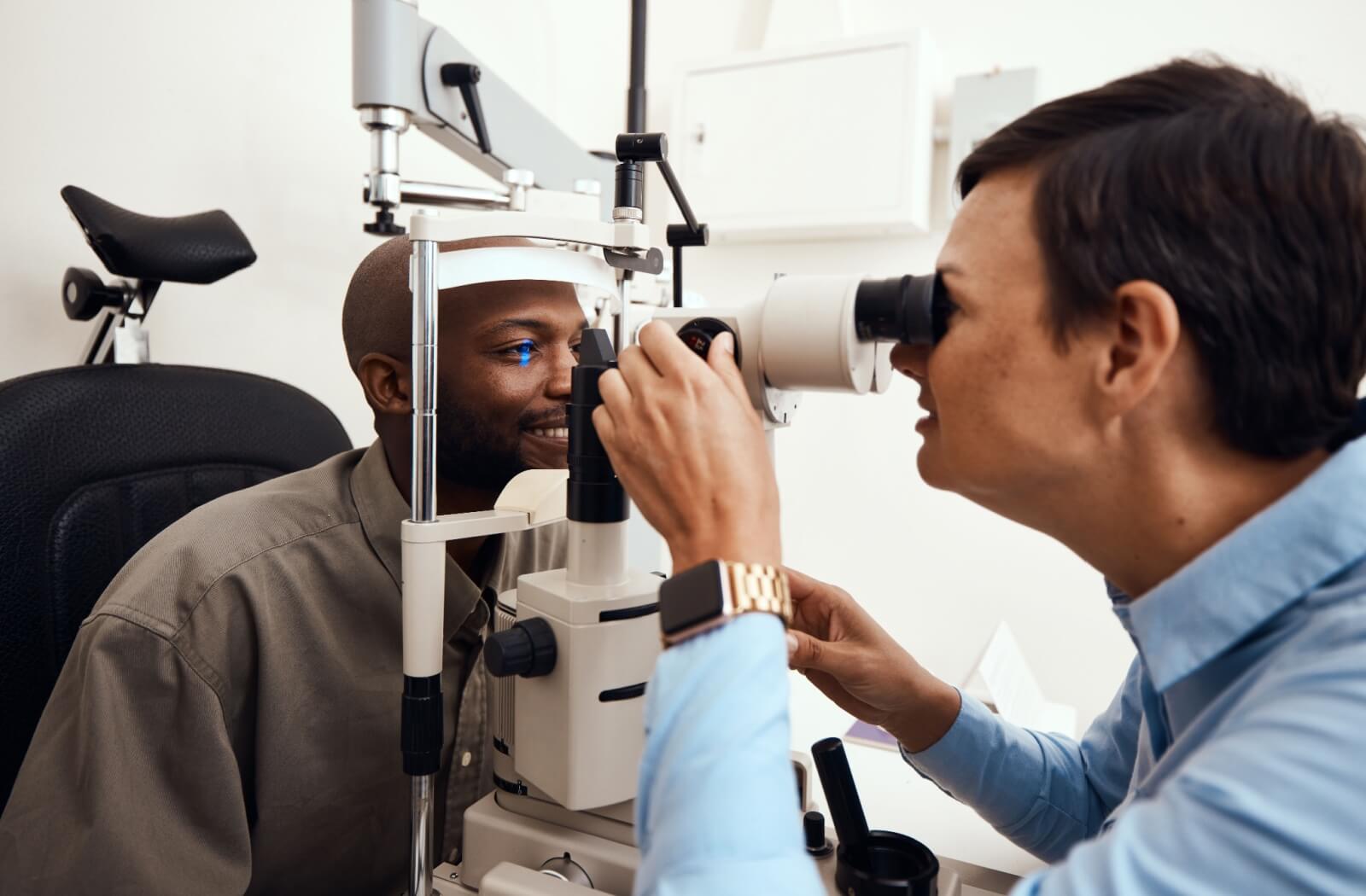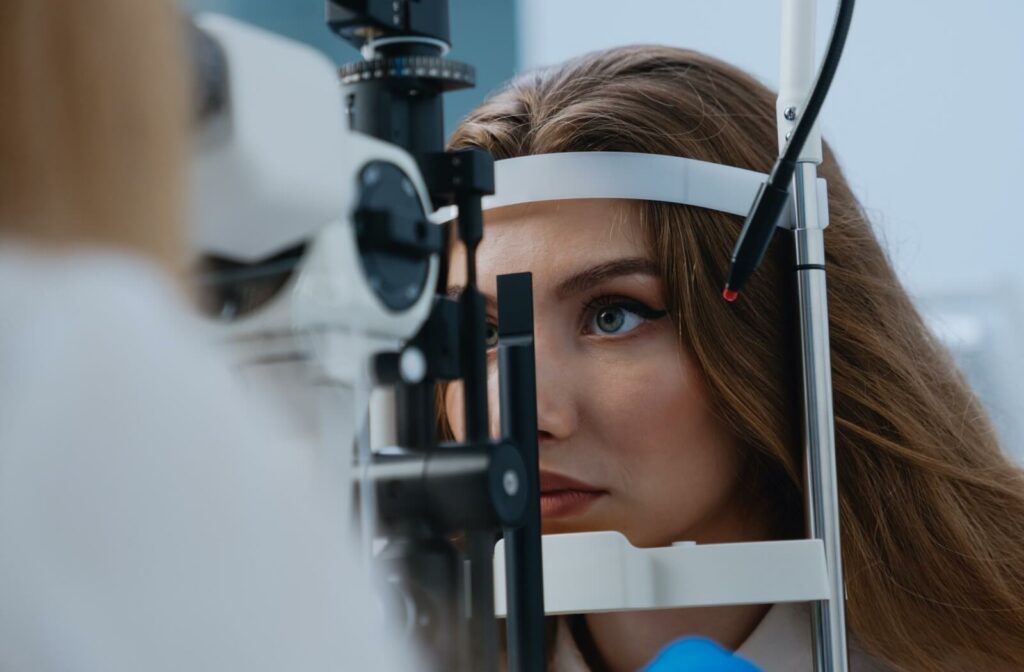Eye exams aren’t just to see whether you need glasses—they’re also an important early-warning system for eye disease. A comprehensive eye exam can also help you spot health problems that affect other parts of the body, too.
Comprehensive eye exams can detect a wide range of eye diseases, including age-related macular degeneration (ARD), cataracts, diabetic retinopathy, glaucoma, and retinal detachment. A comprehensive eye exam can also detect signs of diseases that affect more than just the eyes, like diabetes, hypertension, stress-related illnesses, some neurological disorders, and even some forms of cancer.
Eye Exams vs. Vision Tests
Many different places, from eyewear stores and the DMV to certain apps and websites, offer “vision tests” or “vision screening”. These tests are designed to see whether you need glasses, and if so, what kind and how strong your prescription should be.
The problem with these vision tests is that they only test for refractive errors—the kind of vision problem most people associate with needing glasses). There are many other factors involved in eye health that a vision test at the DMV or an online glasses store just aren’t capable of detecting.
To properly detect eye disease and the effects of other diseases on your eyes, you need to have a comprehensive eye exam performed by a qualified optometrist. Comprehensive eye exams include many other factors, like the shape of your eyes and the muscles that control your eye movements.
Eye Diseases That Can Be Detected by Eye Exams
Age-Related Macular Degeneration
Age-related macular degeneration, or ARD, happens when the macula (the center of the back of your eye) degrades over time. The degradation causes a blurred spot in the center of your vision that can’t be fixed with glasses. ARD is the most common cause of vision loss in seniors.
Cataracts
Cataracts occur when the lens of the eye becomes clouded. They often develop as people get older. Early-stage cataracts can be treated with glasses, but more severe cataracts may require surgery to fix.
Diabetic Retinopathy
Diabetic retinopathy is when diabetes-related complications cause changes to the blood vessels inside the retina (a thin layer at the back of the eye that detects incoming light). These changes in the blood vessels then affect the retina, which can lead to several different kinds of vision problems.
Glaucoma
Glaucoma is a degeneration of the optic nerve, interfering with your eye’s ability to send signals to your brain. Glaucoma-related nerve degeneration can occur over long periods of time (sometimes several years!) before you notice any effects on your eyesight.
Retinal Detachment
Retinal detachment is when the retina becomes detached from the back of the eye. This makes it harder for the eye to transmit signals to the optic nerve, which can cause vision anomalies and even vision loss.
Other Diseases that Can Be Detected in Eye Exams

The American Optometric Association gives a list of over 270 systemic and chronic diseases that can be detected through a comprehensive eye exam.
Diabetes
Diabetes can cause damage to the small blood vessels in your retina, which can be detected by a regular eye exam. With an estimated 8.7 million Americans having undiagnosed diabetes, seeing signs of diabetic retinopathy in an eye exam may be the first sign that a person is diabetic.
Hypertension & Other Cardiovascular Diseases
Hypertension and other cardiovascular diseases can cause damage to blood vessels in the retina and other parts of the eye. High blood pressure often develops without immediate symptoms. The eye is the only part of the body where blood vessels can be viewed non-invasively, and an eye exam can be an important tool for detecting high blood pressure early.
Neurological Conditions & Brain Injuries
Since the eyes are connected directly to the brain via the optic nerve, changes in brain function—including brain injuries—can have effects which are visible in the eyes. For example, multiple sclerosis (MS) causes inflammation of the optic nerve, which can be detected by a comprehensive eye exam..
Neurological conditions can also affect the muscles that control eye movements. Disorders like Parkinson’s, Bell’s palsy, and strokes can all affect the muscles controlling the eyes.
Eye Cancers
There are several different kinds of cancer that can start within the eye itself. Although they’re relatively rare, eye tumors can be especially dangerous because of their proximity to your brain. Likewise, some types of brain cancer may interfere with the optic nerve and eye muscles, and can be detected during eye muscle testing.
Since optometrists also examine the area around your eye, they’re also able to detect any signs of skin cancer developing around your eyes.
Keep An Eye On Your Health
Comprehensive eye exams aren’t just for your eyes. They can be an important tool in maintaining and improving your overall health. If you’re concerned about any of the conditions we’ve discussed, contact Eyedeal Eyecare for an appointment today!




